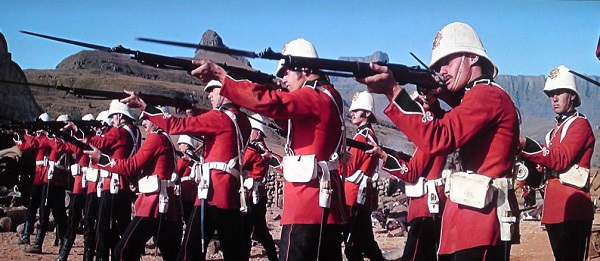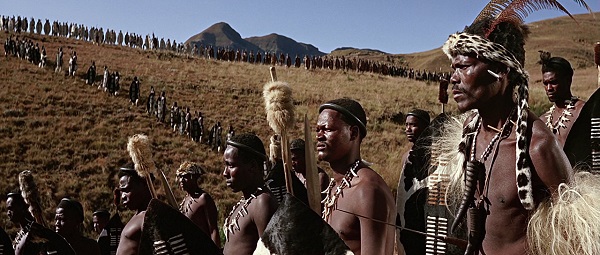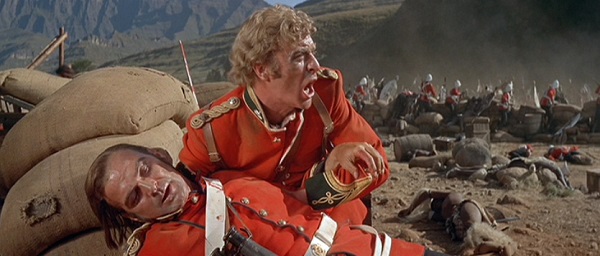Britflix: Zulu
The 1964 war movie
Zulu is very popular in Britain, helping to embed the Battle of Rorke's Drift into the public consciousness and is a fantastic entry in the war movie genre, influencing the likes of Ridley Scott and Peter Jackson.
In 1879, the British army suffered a humiliating defeat against the Zulus after the Battle of Isandlwana, losing 1,500 men. The Zulu King Cetewayo (Chief Mangosuthu Buthelezi) is buoyed by the victory and armed with British rifles, he plans to continue by attacking the missionary station of Rorke's Drift which is being used by the British army as a military hospital.

At Rorke's Drift, there are only 140 troops and because of all the injured and sick men at the hospital, there's no way the British could outrun the approaching Zulus. Lt. John Chard (Stanley Baker) assumes the command of the defense, having to not only battle the 4,000 Zulus, but also resentment from his second -in-command, Lt. Gonville Bromhead (Michael Caine) and Reverend Otto Witt (Jack Hawkins), a drunken missionary who tries to sabotage the army's defense.
Zulu was directed and co-written by Cy Endfield, an American filmmaker who came to Britain after being blacklisted during McCarthyism.
Zulu is Endfield's best known movie, making a luscious looking flick that used Technicolor cinematography and shot mostly on location in South Africa. The color of the army uniforms create a nice contrast to the dry landscape of South African countryside.

Endfield gives us a long build up towards the battle, allowing us a chance to get to know the soldiers and the grave task facing them. The odds are stacked against Chard and his men, before and during the battle, as the soldiers are overwhelmed by the Zulu warriors. The war scenes are well crafted for the time, not afraid to show some blood as the soldiers are forced into close-quarters combat, though some of the deaths are overacted and cheesy.
Zulu features a strong cast of British actors, Baker, Caine, Hawkins and Patrick Magee just to name a few. Caine is particularly memorial in this role because instead of speaking in his normal Cockney accent, he gives his character a very upper class accent. The characters are well defined and memorable, where each of their character arcs feel fully realized. We follow Chard and Bromhead as rivals but the heat of battle make them respect each other, the different types of soldiers that the insubordinate Private Hook (James Booth) and model solider Corporal Allen (Glynn Edwards) are (though in real-life their characteristics were reserved) and Colour Sergeant Bourne (Nigel Green), a religious man who has his own internal conflict as he guards Reverend Witt as he tries to convicts troops to leave before the battle.
Zulu is well acted and there are excellent little touches in each of the characters that enrich these performances, such as Chard nervously loading his revolver as he faces action for the first time.

Despite the Victorian setting,
Zulu never goes into detail about the issue of colonization and is simply played as a film about bravery for the British, men fighting against impossible odd and near certain death. While there are no prominent Zulu characters, they are portrayed as brave, tough warriors and made out to be a noble people. Endfield also used
Zulu as opportunity to show that war was hell for both sides, from the swarm of Zulus getting shot and Surgeon-Major Reynolds (Magee) struggling to treat the wounded.
John Barry, best known for his work on the "James Bond" series, composed the score for
Zulu, providing some of his most memorial music.
Zulu popularized the military song "Men of Harlech" and one of the powerful scenes is when Zulus are chanting before an attack and the British soldiers sings "Men of Harlech" to keep morale up.
Zulu is a deserved classic, filled with power, as it honors the bravery of men who fought against the odds to survive, a movie about a battle that resulted in eleven men getting awarded the Victoria Cross, the highest medal for bravery that the British military can bestow. While there are some historical inaccuracies and this movie is very much from the British perspective
Zulu is a honorable movie and it certainly one of the movies where you can say 'they don't make them like that anymore'.
 At Rorke's Drift, there are only 140 troops and because of all the injured and sick men at the hospital, there's no way the British could outrun the approaching Zulus. Lt. John Chard (Stanley Baker) assumes the command of the defense, having to not only battle the 4,000 Zulus, but also resentment from his second -in-command, Lt. Gonville Bromhead (Michael Caine) and Reverend Otto Witt (Jack Hawkins), a drunken missionary who tries to sabotage the army's defense.
Zulu was directed and co-written by Cy Endfield, an American filmmaker who came to Britain after being blacklisted during McCarthyism. Zulu is Endfield's best known movie, making a luscious looking flick that used Technicolor cinematography and shot mostly on location in South Africa. The color of the army uniforms create a nice contrast to the dry landscape of South African countryside.
At Rorke's Drift, there are only 140 troops and because of all the injured and sick men at the hospital, there's no way the British could outrun the approaching Zulus. Lt. John Chard (Stanley Baker) assumes the command of the defense, having to not only battle the 4,000 Zulus, but also resentment from his second -in-command, Lt. Gonville Bromhead (Michael Caine) and Reverend Otto Witt (Jack Hawkins), a drunken missionary who tries to sabotage the army's defense.
Zulu was directed and co-written by Cy Endfield, an American filmmaker who came to Britain after being blacklisted during McCarthyism. Zulu is Endfield's best known movie, making a luscious looking flick that used Technicolor cinematography and shot mostly on location in South Africa. The color of the army uniforms create a nice contrast to the dry landscape of South African countryside.
 Endfield gives us a long build up towards the battle, allowing us a chance to get to know the soldiers and the grave task facing them. The odds are stacked against Chard and his men, before and during the battle, as the soldiers are overwhelmed by the Zulu warriors. The war scenes are well crafted for the time, not afraid to show some blood as the soldiers are forced into close-quarters combat, though some of the deaths are overacted and cheesy.
Zulu features a strong cast of British actors, Baker, Caine, Hawkins and Patrick Magee just to name a few. Caine is particularly memorial in this role because instead of speaking in his normal Cockney accent, he gives his character a very upper class accent. The characters are well defined and memorable, where each of their character arcs feel fully realized. We follow Chard and Bromhead as rivals but the heat of battle make them respect each other, the different types of soldiers that the insubordinate Private Hook (James Booth) and model solider Corporal Allen (Glynn Edwards) are (though in real-life their characteristics were reserved) and Colour Sergeant Bourne (Nigel Green), a religious man who has his own internal conflict as he guards Reverend Witt as he tries to convicts troops to leave before the battle. Zulu is well acted and there are excellent little touches in each of the characters that enrich these performances, such as Chard nervously loading his revolver as he faces action for the first time.
Endfield gives us a long build up towards the battle, allowing us a chance to get to know the soldiers and the grave task facing them. The odds are stacked against Chard and his men, before and during the battle, as the soldiers are overwhelmed by the Zulu warriors. The war scenes are well crafted for the time, not afraid to show some blood as the soldiers are forced into close-quarters combat, though some of the deaths are overacted and cheesy.
Zulu features a strong cast of British actors, Baker, Caine, Hawkins and Patrick Magee just to name a few. Caine is particularly memorial in this role because instead of speaking in his normal Cockney accent, he gives his character a very upper class accent. The characters are well defined and memorable, where each of their character arcs feel fully realized. We follow Chard and Bromhead as rivals but the heat of battle make them respect each other, the different types of soldiers that the insubordinate Private Hook (James Booth) and model solider Corporal Allen (Glynn Edwards) are (though in real-life their characteristics were reserved) and Colour Sergeant Bourne (Nigel Green), a religious man who has his own internal conflict as he guards Reverend Witt as he tries to convicts troops to leave before the battle. Zulu is well acted and there are excellent little touches in each of the characters that enrich these performances, such as Chard nervously loading his revolver as he faces action for the first time.
 Despite the Victorian setting, Zulu never goes into detail about the issue of colonization and is simply played as a film about bravery for the British, men fighting against impossible odd and near certain death. While there are no prominent Zulu characters, they are portrayed as brave, tough warriors and made out to be a noble people. Endfield also used Zulu as opportunity to show that war was hell for both sides, from the swarm of Zulus getting shot and Surgeon-Major Reynolds (Magee) struggling to treat the wounded.
John Barry, best known for his work on the "James Bond" series, composed the score for Zulu, providing some of his most memorial music. Zulu popularized the military song "Men of Harlech" and one of the powerful scenes is when Zulus are chanting before an attack and the British soldiers sings "Men of Harlech" to keep morale up.
Zulu is a deserved classic, filled with power, as it honors the bravery of men who fought against the odds to survive, a movie about a battle that resulted in eleven men getting awarded the Victoria Cross, the highest medal for bravery that the British military can bestow. While there are some historical inaccuracies and this movie is very much from the British perspective Zulu is a honorable movie and it certainly one of the movies where you can say 'they don't make them like that anymore'.
Despite the Victorian setting, Zulu never goes into detail about the issue of colonization and is simply played as a film about bravery for the British, men fighting against impossible odd and near certain death. While there are no prominent Zulu characters, they are portrayed as brave, tough warriors and made out to be a noble people. Endfield also used Zulu as opportunity to show that war was hell for both sides, from the swarm of Zulus getting shot and Surgeon-Major Reynolds (Magee) struggling to treat the wounded.
John Barry, best known for his work on the "James Bond" series, composed the score for Zulu, providing some of his most memorial music. Zulu popularized the military song "Men of Harlech" and one of the powerful scenes is when Zulus are chanting before an attack and the British soldiers sings "Men of Harlech" to keep morale up.
Zulu is a deserved classic, filled with power, as it honors the bravery of men who fought against the odds to survive, a movie about a battle that resulted in eleven men getting awarded the Victoria Cross, the highest medal for bravery that the British military can bestow. While there are some historical inaccuracies and this movie is very much from the British perspective Zulu is a honorable movie and it certainly one of the movies where you can say 'they don't make them like that anymore'.